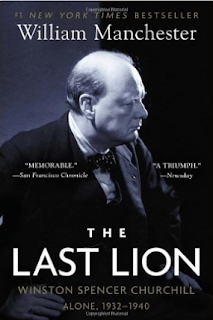Yesterday I went to the post office to pick up my copy of
William Manchester’s second volume of The Last Lion: Winston Spencer
Churchill: Alone 1932-1940.
This morning my daughter brought to my attention that Benjamin Netanyahu on the way to Poland was reading the
third volume of the same book! The Last Lion: Winston Spencer
Churchill: Defender of the Realm, 1940-1965
Here are two excerpts from volume 2, page 14. Incredible
how one man’s generosity can save the world!
It also explains, in part, Winston’s fondness for Baruch,
though Baruch’s appeal is broader. He is an American, he is Jewish, he
recognizes the menace of an aggressive Germany, and Churchill is indebted to him
for an extraordinary act of shrewdness and generosity. Winston was badly hurt
in the Wall Street Crash three years ago. Had it not been for Baruch, however,
it would have been much worse; he could have spent the rest of his life in
debt. He is not a born gambler; he is a born losing gambler. In New York
at the time, he dropped into Baruch’s office and decided to play the market,
and as prices tumbled he plunged deeper and deeper, trying to outguess the
stock exchange just as he had tried to outguess roulette wheels on the Riviera.
In Wall Street, as in Monte Carlo, he failed. At the end of the day he
confronted Baruch in tears. He was, he said, a ruined man. Chartwell and
everything else he possessed must be sold; he would have to leave the House of
Commons and enter business. The financier gently corrected him. Churchill, he
said, had lost nothing. Baruch had left instructions to buy every time
Churchill sold and sell whenever Churchill bought. Winston had come out exactly
even because, he later learned, Baruch even paid the commissions.
And on page 137, these words spoken by Churchill in the House of Commons on May 2,1935, which are applicable without change today
And on page 137, these words spoken by Churchill in the House of Commons on May 2,1935, which are applicable without change today
When the situation was manageable it was neglected, and now
that it is thoroughly out of hand, we apply the remedies which then might have effected
a cure. There is nothing new in the
story. It is as old as the Sibylline books. It falls into that long dismal
catalogue of the fruitlessness of experience and the confirmed unteachability of
mankind. Want of foresight, unwillingness to act when action would be simple
and effective, lack of clear thinking, confusion of counsel until the emergency
comes, until self-preservation strikes its jarring gong – these are the
features which constitute the endless repetition of history.


